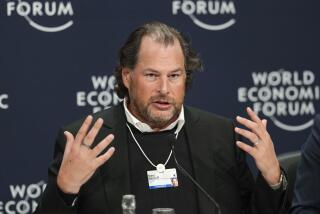2 Boesky Associates Turn Over Key Evidence of Trading Pacts
- Share via
NEW YORK — Two associates of stock speculator Ivan F. Boesky have given government investigators key evidence indicating that Boesky had arrangements with several brokerage firms under which the firms bought stock from him with the implicit understanding that he would later repurchase it.
Boesky later demanded a share of these firms’ profits from their holdings of those stocks, sources have told The Times.
The sale and repurchase arrangement, known as “parking,” is illegal to the extent that it would allow Boesky to secretly accumulate large interests in takeover targets without publicly disclosing his holdings. By law, shareholders must disclose any ownership of 5% or more of a company.
Parking would also allow Boesky to illicitly avoid violating net capital requirements, which limit the securities holdings of an investment firm to a certain multiple of its net worth. In some cases, sources said, parking may also have relieved cash shortages at Boesky’s firm.
The associates said to be providing the evidence are Michael Davidoff, Boesky’s former director of trading, and Set Mooradian, who was director of the accounting department of Boesky’s own firm and is still a vice president there.
Davidoff pleaded guilty earlier this year to a felony charge related to technical violations of securities laws. His sentencing, originally scheduled for Thursday, has been postponed to a date in June, according to his attorney, Paul Rooney.
Mooradian, whose name has not previously emerged in connection with the Securities and Exchange Commission’s investigation into Wall Street abuses of corporate takeover rules, has not been charged by the government with a crime or civil violation. Sources said he has been cooperating with government investigators. Mooradian’s lawyer, Robert Romano, declined to comment.
Both Davidoff and Mooradian knew of at least some of Boesky’s arrangements with the other firms, according to sources familiar with the government investigation. Among the firms under investigation in the trading scheme, the sources said, are Drexel Burnham Lambert of New York, the Los Angeles brokerage of Jefferies & Co. and several other firms of stock arbitrageurs and traders.
“There’s no question Davidoff is cooperating with the government and implicating people in parking arrangements,” one attorney familiar with the investigation said.
The SEC on Nov. 14 announced that Boesky, then Wall Street’s best-known speculator in takeover stocks, had settled insider trading charges by agreeing to pay $100 million in fines and penalties. He also agreed to cooperate with the government’s continuing investigation and to plead guilty to a single felony count.
Davidoff pleaded guilty Jan. 28 to a felony charge of violating minimum-capital rules at Seemala Corp., one of Boesky’s principal investment firms. Federal prosecutors had charged that he had sold securities to the London brokerage of Seligmann & Harris and quickly repurchased them, a maneuver that resembles parking.
According to sources familiar with the investigation, parking worked like this:
- Boesky would sell blocks of stock in companies subject to unannounced merger bids to his partners in the arrangements.
- At a later date and pursuant to an unwritten understanding, Boesky would repurchase the shares, leaving his partners with a generous profit, either from the natural run-up of the stocks’ price or by paying a premium price for the shares.
- After that, the sources said, Boesky often demanded a share of the firms’ profits from holding the stock in question. Government investigators are probing whether a $3-million payment made to Boesky by the Jefferies firm in 1985 reflected this kind of arrangement.
Jefferies’ president, Frank E. Baxter, declined in a telephone interview from his Los Angeles office to comment on the allegations. “The SEC is conducting a private investigation, and we are not at liberty to discuss it,” he said.
At Drexel, Boesky reportedly had a more involved relationship that may have included Drexel executives parking stock with Boesky. Several Drexel executives, including Michael Milken, head of the firm’s fabled “junk bond” trading department, have been subpoenaed in connection with the investigation.
Among the topics of the government’s probe of Drexel is the rationale for a $5.3-million payment that Boesky made to the firm in 1985 or early 1986. Although Drexel contends that it received the payment for investment services, one senior Drexel executive said: “I’ve never heard a good explanation for that payment.”
A Drexel spokesman, asked to comment on the parking allegation, said: “We’re not going to be in a position of responding to every report. We’re not aware of any wrongdoing by our firm or any of our employees.”
Secret records identifying the firms that received parked stock from Boesky, their profits and the amount he considered his rightful share are among the evidence provided to government probers by Davidoff, sources said. At least one set of documents was produced by Mooradian’s department, kept by Davidoff in his own files and later passed on to the investigators in the course of plea-bargain negotiations by Davidoff, they add.
Sources said Mooradian was aware of at least some of the parking arrangements and is cooperating with investigators.
Firms entering parking arrangements with Boesky could be vulnerable to civil SEC charges for violating a wide range of securities laws. These include rules requiring timely filings of 13-D forms, the disclosure forms for holders of 5% or more of a company’s stock; requirements that brokerage firms maintain adequate net capital, and prohibitions against stock manipulation.
Legal sources said that while violations of many of these rules carry only modest civil penalties, willful violations can lead to criminal charges. However, lawyers familiar with the investigation said probers have been hampered by the scarcity of concrete evidence proving that the firms had an explicit understanding of Boesky’s plans to repurchase their stakes. The profit-sharing payments to Boesky, the sources contend, were generally disguised as payments for some legitimate purpose.
Some of the firms have reportedly told the government that while they may have bought stock from Boesky and allowed him to repurchase it, they had no understanding of his plans in advance and no indication that he was directing the trading on the basis of inside information.
More to Read
Inside the business of entertainment
The Wide Shot brings you news, analysis and insights on everything from streaming wars to production — and what it all means for the future.
You may occasionally receive promotional content from the Los Angeles Times.










